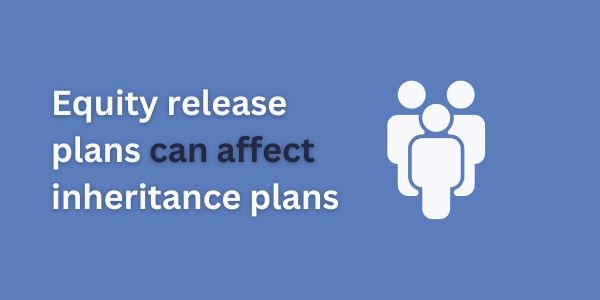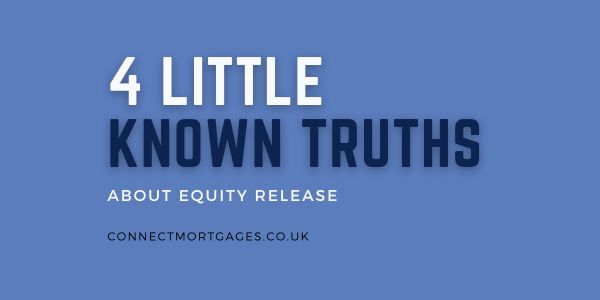Are you looking to access the equity in your home without having to move out? Equity release is becoming an increasingly popular option for those over the age of 55 who are looking to release funds from their home. Equity release could be a great option for you. Before you take out a plan, read these 4 little known truths about equity release.
While these plans offer access to funds that can help with a variety of financial goals, there are often little known truths about equity release.
However, there are some things that you should know before deciding if it’s the right choice for you.
Here are the 4 little known truths about equity release that may help inform your decision. Keep reading to learn more.
What Is Equity Release?
Equity release is a way of accessing the money tied up in your home without selling it. This can be done through a lifetime mortgage or home reversion plan.
With a lifetime mortgage, you borrow against your property and use the money for whatever purpose you choose.
As with any mortgage, you must repay regularly until the loan is paid off. With a home reversion plan, you sell all or part of your home in exchange for a lump sum of money.
Here are the following 4 little known truths about equity release:
1. Not all equity release plans are the same:

Not all equity release plans are the same. Some plans limit how much you can borrow, while others may set specific eligibility requirements.
Plans also differ in interest rates and repayment terms. It is important to research thoroughly before deciding on any plan.
Some plans need regular repayments, while others let you make lump sum payments when it suits you.
Consider these factors carefully before selecting a plan to ensure it meets your needs.
2. You don’t have to be retired:
Many people think you have to be retired in order to access equity release, but that is not the case. In fact, you don’t even need to be close to retirement age.
Equity release is available to people of any age, as long as they are over 55 and own their own home.
This means you could potentially release equity to pay for home improvements or even to fund a new business venture, rather than waiting until retirement.
3. Remain in your home until you die or move into long-term care:
Equity release products allow homeowners to access the value tied up in their property without the need to sell or move. These products are designed for individuals who plan to stay in their homes until they pass away or move into long-term care.
You can remain in your property for the duration of the loan. Some lenders may permit you to transfer the loan to another property if you decide to move. However, this is subject to the lender’s criteria and approval process.
It is essential to understand that equity release loans are aimed at those intending to remain in their homes permanently or until a move to long-term care becomes necessary.
4. Keep Ownership of Your Home:
One of the most important things to remember when considering equity release is that you always keep ownership of your home.
This means you can remain in your home for as long as you wish without worrying about being evicted or moving out.
This allows you to stay in your home as long as you want and enjoy the benefits of your accumulated equity. It also allows you to pass on your home to your beneficiaries.
Some more truths about equity release:
Equity release plans can affect inheritance plans:

One of the key factors to consider with equity release plans is their potential effect on inheritance.
Equity release plans are often used to unlock the wealth tied up in a home. However, if not structured correctly, they may reduce the inheritance left to loved ones.
This happens because money released from home equity is usually not reinvested. As a result, the overall value of the estate decreases.
If repayments are scheduled after the homeowner passes away, this can further reduce the estate’s value. Consequently, the amount available for inheritance may be lower.
Payments can be made in a lump sum or regular instalments
Choosing between a lump sum or regular instalments depends on individual circumstances and preferences.
A lump sum payment may offer a lower interest rate, making it more cost-effective.
Alternatively, regular instalments could suit those who prefer smaller, manageable payments.
The more payments someone can make, the less interest will accumulate over time. This can help reduce the total cost of borrowing.
Equity release plans can affect your entitlement to state benefits
When you take out an equity release plan, it is essential to be aware of how it may affect your entitlement to state benefits.
Generally, any money you receive from the plan will be considered when calculating your entitlement to certain means-tested benefits such as pension credit.
To be clear, your state pension will not be affected by any decision to take equity release.
If you are already receiving benefits, seeking advice from your local authority before entering into an equity release plan is essential.
It is also important to note that if you have dependent children, you may have to pay additional costs due to the plan.
Taking out an equity release plan can also affect your inheritance tax liability and other taxes, such as income or capital gains tax.
Not all property types are eligible for equity release plans
Not all property types are suitable for equity release plans.
Most traditional home types are usually accepted. However, specific properties, such as listed buildings, flats, and those in high-risk flood areas, may not qualify.
Some equity release providers may consider non-standard properties, but these plans often come with different terms and conditions.
It is vital to consult with the provider or a mortgage adviser for more detailed information. This approach can help prevent disappointment later.
Equity release may provide financial support during retirement. However, it is crucial to understand the risks and carefully evaluate the options available.
Taking time to research ensures you make a well-informed decision. This process helps to confirm the equity release plan selected is the most suitable for your needs and circumstances.
Thank you for reading our “4 Little Known Truths About Equity Release | Talk to Connect.” Stay “Connect“-ed for more updates soon!







